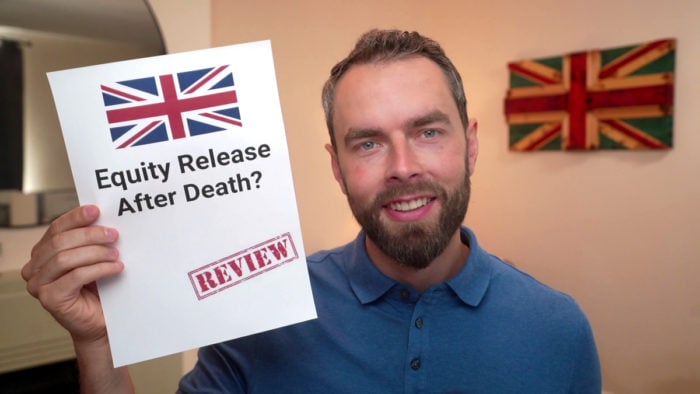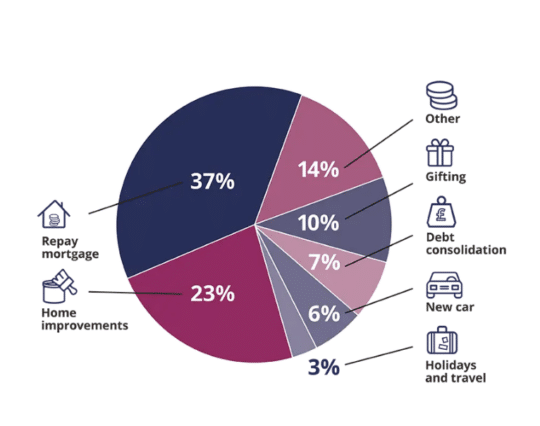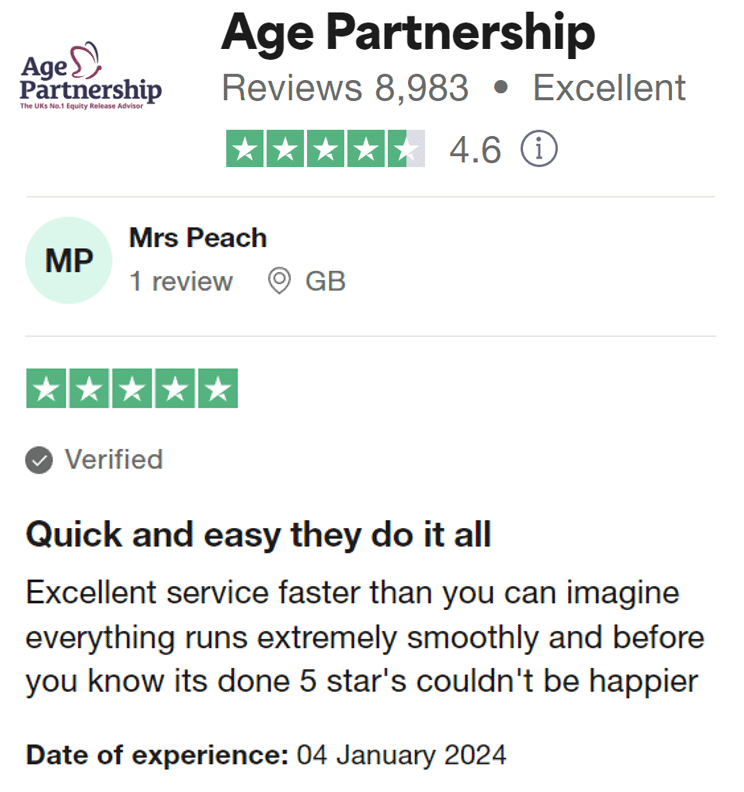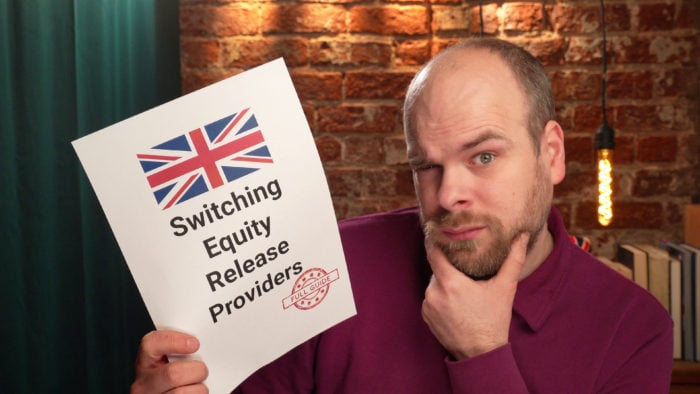Equity Release and What Happens After Death – Updated Rules
Our preferred equity release adviser is Age Partnership. For free and impartial money advice you can visit MoneyHelper.

Our preferred equity release adviser is Age Partnership. For free and impartial money advice you can visit MoneyHelper.
Are you curious about equity release and what happens after death? You’ve come to the right place. At MoneyNerd, we help over 7,000 people each month understand the ins and outs of equity release. This article can help you to:
- Learn what equity release really is.
- Understand the two types of equity release plans.
- Find out what happens to your equity release if you or your partner pass away.
- Discover how equity release can affect the probate process.
- Learn if and when your equity release loan can be repaid before death.
We know that equity release can seem tricky to navigate. But rest assured, we’ve got you covered. MoneyNerd is here to guide you through every step, making the process less daunting.
We’ll help you make sense of it all, so you can make the best choices for you and your loved ones. Let’s get started.
Equity release – what happens on death?
When you pass away and have no surviving spouse or partner who also owns your home, the equity release loan will need to be repaid. The money comes out of your estate through the sale of the property.
Once the property is sold, the equity release lender can request the money owed to them, but they cannot take anything more than their share.
For example, if they have a 50% share of your property in a home reversion scheme, they cannot take more than 50% of the money from the property sale.
And if they own all of your property as part of a lifetime mortgage, and it sells for less than the total debt, they cannot take any more money from your estate, as per the negative equity guarantee (discussed in detail later!).
But what happens to my equity that you still own? If you have a home reversion plan and have opted to “ring-fence” a percentage of your property value for beneficiaries in your will, this percentage of the property remains theirs and cannot be taken by the equity release provider.
What happens if your beneficiaries want to keep your property?
It’s sometimes possible to avoid the property being sold if the beneficiaries of the will would prefer to keep the property. They may be allowed to pay off the debt from other money within the estate, or even pay some of their own money into the estate to clear the debt and keep the house.
This is not always possible as there are inheritance implications that can come into play.
How equity release could help
More than 2 million people have used Age Partnership to release equity since 2004.
How your money is up to you, but here’s what their customers do…
Find out how much equity you could release by clicking the button below.
In partnership with Age Partnership.
What happens if your plan provider goes bust?
On rare occasions, an equity release plan provider can go bust and stop operating. If this happens to your lender, you’re probably wondering what happens to your existing equity release plan.
It’s highly likely that all equity release products will be sold to another provider and they will take over your plan. The new equity release provider will need to follow the terms of your existing plan precisely as you had agreed with the previous lender.
» TAKE ACTION NOW: Fill out the short debt form
Who repays the lender?
So, who repays the plan when you die? It is the last surviving partner – or the sole homeowner – who is responsible to repay the loan, which will come out of their estate.
As long as the equity release plan is governed by the Equity Release Council, in no circumstances will any beneficiaries have to pay from their own pocket. Although the amount of inheritance they will eventually receive will be reduced.
Once the home is sold from their estate, either lawyers or whoever is in charge of probate will be responsible for paying the lender the correct amount of money from the sale proceeds.
It will be paid by the homeowner directly if they need to repay the loan because they have moved into long-term care.
Join thousands of others who release equity
Age Partnership have helped over 2 million people release equity from their home.

Mrs Wareham
“I am more than pleased to have taken out Equity Release with Age Partnership.”
Reviews shown are for Age Partnership. Search powered by Age Partnership.
Why you might consider releasing equity
The most popular reason individuals and couples choose to release equity is to make retirement more comfortable. The money might help you with financial planning for retirement to help you retire early, tick things off your bucket list or even repay outstanding debts in later life.
Another common reason for releasing equity is to give all or some of the money to a family member. In recent years, this is often done to help the family member buy their own property.
Also, studies found that over half of equity release customers use equity release to fund home improvement projects1.
What happens if house prices fall?
The equity release guarantee prevents equity release providers from asking for more money than what is raised through the sale of the house.
If house prices fall and the homeowner is in negative equity, meaning they owe more on the equity release loan than their property is worth, they do not have to pay anything more than the sale price.
Anything else within the estate, such as savings, does not have to be used to repay the lender, nor do the beneficiaries of the will have to pay the lender the shortfall.
This negative equity guarantee is one of the most attractive aspects of using an equity release plan.
How much do you pay back on equity release?
The amount you pay back after using an equity release plan will depend on if you used a home reversion scheme or a lifetime mortgage.
With a home reversion scheme, the company gets an amount equal to the share of the property they now own. For example, if they own 50% of the property, they will get 50% of the money raised from the sale of the property.
Because no interest is added, the amount owed is straightforward. However, these lenders will make significantly low offers to ensure profits even if the home value has decreased.
With a lifetime mortgage, the amount you pay back on your equity release plan will depend on three factors, namely:
- The fixed interest rate you agreed to
- The time elapsed between the start of the mortgage and when you die or go into long-term care
- The amount of money released
For example, taking out a lifetime mortgage of £65,000 at a fixed interest rate of 6.4% over 12 years would equate to a total debt of just below £137,000. Although your debt can accumulate fast, it’s important to remember that you can never owe more than the value of the property when the sale of your home is completed.
Equity Release Comparison
We’ve put together this table to help you better understand the differences between a home reversion plan and a lifetime mortgage.
If you want to learn more about these equity release types and how they could affect your children’s inheritance, be sure to read our detailed guide.
| Category | Home Reversion Plan | Lifetime Mortgage |
|---|---|---|
| Ownership of the Property | You will sell either a portion of or the whole value of the home and then be allowed to stay on the property as a tenant. The lender will become a co-owner. | When you take out the secured loan against the property, it will remain in your ownership until you pass/move into long-term care. |
| Change in Value of the Property | With a co-ownership, you will be directly impacted by the property’s value in current markets. This means that you could just as easily lose out on money in the case of a value decrease as you could benefit from an increase. | Since this loan is typically paid off by the sale of the property after passing/owner is moved into long-term care, the value of the home after this case may impact how much money will be left to the estate/family once it has been sold. |
| Inheritance | While some plans do offer a guaranteed inheritance amount, it is likely that the inheritance will be dramatically reduced because you’ve sold a large portion of the property. | Some lifetime mortgages allow for an inheritance protection scheme, but the overall inheritance amount is decided by the loan size and accrued interest. |
| Repayment | No repayment required during your lifetime. It will be paid back once the property is sold. | Some lifetime mortgages allow for partial, voluntary repayments during your lifetime. However, the majority of the loan will be paid back once the property is sold. |
| Type of Payment | There is a choice between a lump sum payment or a regular income with this loan. You can also choose a mixture of the two. | You can either receive a lump sum loan, or you can choose a drawdown facility which allows you to take out money whenever you need it. |
Do you have to pay taxes?
The money you receive from equity release is not subject to income tax or Capital Gains Tax (CGT)2. Only money you receive from employment or income as a self-employed sole trader is subject to income tax. And Capital Gains Tax is applied to profits when you sell an asset, such as a home.
Of course, the former does not apply, but why do you not have to pay CGT on equity release? The answer is that you have not sold your property.
Although it may feel like selling your property and continuing to live in it, what has actually happened is you have taken out a loan against some or all of the property. Money from loans is not subject to any UK tax.
There is a possibility that releasing equity and gifting the money to someone can reduce inheritance tax (IHT). However, this is risky and might not be worth it overall.
What’s the catch with equity release?
There is no ‘catch’ with equity release if you take the time to understand what an equity release plan is and what it is not.
The FCA reports that many lifetime mortgages work well for consumers, especially those who couldn’t afford traditional mortgages or borrowing. However, some lifetime mortgages do not work out well for consumers, often because they weren’t informed enough before they applied.3
To understand an equity release plan, you’ll need to complete independent research (yay – you’re doing it already!) and speak with professional advisers that are authorised and regulated by the Financial Conduct Authority and not connected to the equity release provider in any way.
You should also check out the Equity Release Council website, which has lots of useful information about your rights.
Some people perceive the ‘catch’ of equity release to be the significant interest added within some lifetime mortgages or the significantly low offers in home reversion schemes. Although these can seem unfair, lenders do this to protect themselves and to almost guarantee some degree of profit.
Some other risks of equity release include:
- The impact on means-tested benefits
- Your debt will increase due to interest
- You’re unable to take another loan against your property
- Fees associated with equity release
Does equity release interest stop on death?
The interest added to a lifetime mortgage stops being added when the final homeowner passes away. For example, if one homeowner dies but there is a surviving partner, interest will be added as normal.
Only once the surviving partner dies does interest stop being added to the lifetime mortgage debt. At this point, the property will need to be vacated as it is owned by the equity release provider.
Family, friends or beneficiaries will need to inform the equity release plan provider of the death and need to provide them with a death certificate.
How does it affect probate?
Equity release plans can slow probate down if it is the surviving spouse or partner who has died. This is because the process will need to ensure the debt is fully paid back from the sale of your property.
Overall, it makes probate slightly more complex, but liaising effectively with the equity release company can make things easier. Most lenders have dedicated teams to assist with the paperwork and formalities.
Can it be paid in fu before death?
It is possible to pay back some or all of your total equity release debt before you die.
When you have a lifetime mortgage, you can decide to pay off some or all of the interest while you are alive. This will reduce your overall debt when you pass away, leaving beneficiaries with a greater inheritance.
You might choose to repay all the money owed and end your equity release plan. This is possible on some plans but may not be possible on others. If you do this though, the costs can be expensive. This is due to equity release lenders usually applying eye-watering early repayment charges for exiting the agreement early.


